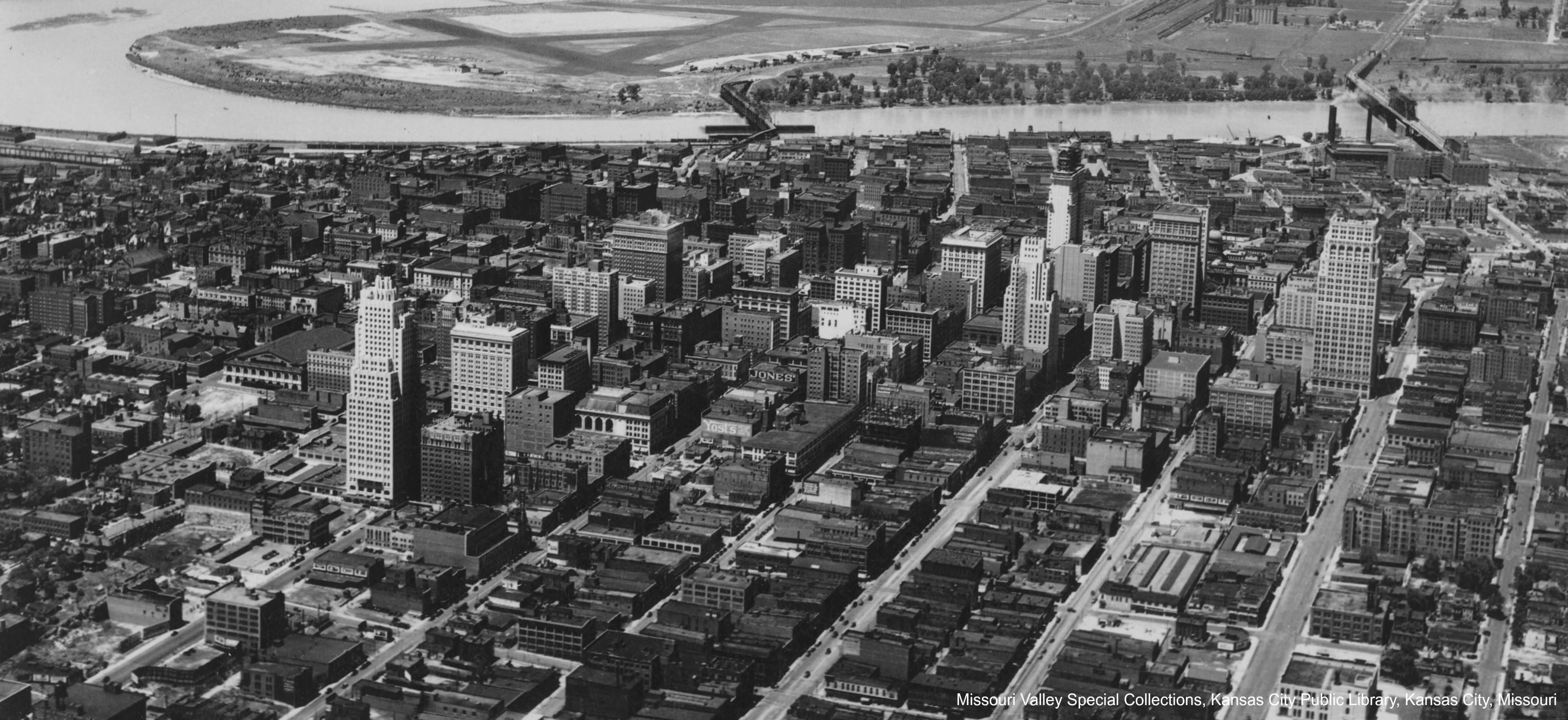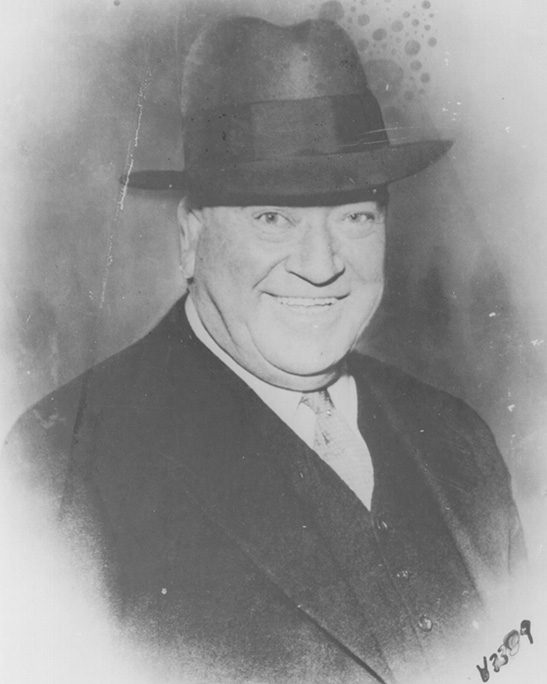Wide Open Town: Kansas City during the Pendergast Era
Registration Requested
Friday, April 1 & Saturday, April 2
Kansas City Public Library – Plaza Branch
4801 Main Street, Kansas City, MO 64112
The Wide Open Town Symposium, featuring presentations from professional historians and a keynote lecture at the Kansas City Public Library’s Plaza Branch, explores this dynamic period in Kansas City’s history. This two-day conference is free and open to the general public.
The ’20s and ’30s marked Kansas City’s transformation from a rough “cowtown” on the Great Plains into a modern city that boasted an expanding population, a developing urban core, and a cultural fluorescence best characterized by its vibrant nightlife and jazz scene. Kansas City established a national reputation in this period, prompting many modern observers to consider it the city’s “golden age.” Underneath the gilded veneer, however, the era was marred by the political corruption that emerged from the Pendergast Machine, by the Great Depression, and by strained relations among the races and sexes. Even with a decidedly mixed legacy, this period largely defined Kansas City’s reputation for much of the 20th century.
Keynote Address:
David M. Kennedy
“The Great Depression: Causes, Impact, Consequence”
RSVP Requested
Friday, April 1, 2016
Reception: 6 p.m. | Program: 6:30 p.m.
Kansas City Public Library – Plaza Branch, 4801 Main Street, Kansas City, MO 64112
Providing national context for the Wide Open Town symposium, David M. Kennedy, Donald J. McLachlan Professor of History, Emeritus, at Stanford University, assesses the transformational period of American history during the 1920s and ‘30s, emphasizing the impact of the Great Depression.
The Wide Open Town Symposium is organized by the Kansas City Public Library, the Center for Midwestern Studies and the History Department at the University of Missouri-Kansas City. It is co-sponsored by the Freedom’s Frontier National Heritage Area, the UMKC Bernardin Haskell Lectures Fund, the UMKC Office of Research Services, and the UMKC High School/College Partnership.
Continuing Education Credit
Interested in earning college credit while attending the two-day conference? UMKC is running a one-credit hour course alongside the conference.
Please contact UMKC Continuing Education Division for more information at umkccasce@umkc.edu or 816-235-2736
WIDE OPEN TOWN: Kansas City during the Pendergast Era
FRIDAY, APRIL 1, 2016
SESSION I: POLITICS HIGH AND LOW / 9 – 11:30 a.m.
John McKerley, Adjunct Assistant Professor, University of Iowa Labor Center, “‘Persistent and Honorable Agitation:’ The Struggle for Black Political Power in Kansas City and the ‘Failure’ of Disfranchisement.”
Jeffrey Pasley, Professor of History, University of Missouri – Columbia, “Farewell to the Party of Jefferson.”
Dustin Gann, Lecturer & Honors Faculty, Arizona State University, “‘Our Time to Shine:’ The 1928 Republican National Convention.”
David Hanzlick, Adjunct Faculty, Park University, Adjunct Faculty, Rockhurst University, “Moving Forward: Women’s Organizations and the Claim to Political Space.”
Kyle Anthony, Assistant Professor, University of Saint Mary, “‘The Bitterest Battle:’ The ILGWU and Unionization in the Kansas City Garment District.”
LUNCH BREAK / 11:30 a.m. – 1:30 p.m.
Teaching Kansas City Between the Wars Workshop
11:30 a.m. – 1:30 p.m.
A workshop for local K-12 teachers that will provide them with the opportunity to engage with some of the conference scholars about the issue of teaching this topic. (This workshop is not open to the general public. Contact midwest@umkc.edu for details.)
SESSION II: BUILDING COMMUNITIES IN A SEGREGATED CITY / 1:30 p.m. – 3:30 p.m.
Henrietta Wood, Assistant Teaching Professor, Honors College, UMKC, Participating in the “Persistent Protest:” Lucile Bluford and The Call in Kansas City, 1932-1941
Marc Rice, Professor of Music, Musicology, Truman State University, “‘Kansas City On Tip-Toe:’ Charity, Politics, Dancing, and Jazz near 18th and Vine in the 1920s.”
Valerie Mendoza, Lecturer, Department of American Studies, University of Kansas, “Kansas City’s Guadalupe Center and the Mexican Immigrant Community, 1919-1940.”
Stuart Hinds, Director of Special Collections, Miller Nichols Library, UMKC, “From Proscenium to Inferno: The Interwar Transformation of Female Impersonation in Kansas City.”
KEYNOTE ADDRESS (details above) / 6:30 p.m., Preceded by a 6 p.m. Reception
David Kennedy, Donald J. McLachlan Professor of History, Emeritus, Stanford University,
“The Great Depression: Causes, Impact, Consequence.”
RSVP Requested
SATURDAY, APRIL 2, 2016
SESSION III: ARTS AND CULTURE / 9 – 11 a.m.
Keith Eggener, Marion D. Ross Distinguished Professor of Architectural History, University of Oregon, “Kansas City’s Liberty Memorial: Remembering Then and Now.”
Pellom McDaniels, Associate Professor, Emory University,
“Bringing the News: The Social, Political and Economic Importance of Black Baseball to Kansas City’s African American Community, 1919-1939.”
Chuck Haddix, Director, Marr Sound Archives, Producer, KCUR-FM, University of Missouri – Kansas City, University Libraries, “The Coon-Sanders Nighthawks Orchestra: The Band that Made Radio Famous.”
Henry Adams, Ruth Coulter Heede Professor of Art History, Case Western Reserve University, “Thomas Hart Benton and Kansas City’s Golden Age.”
LUNCH BREAK / 11 a.m. – 12:30 p.m.
SESSION IV: THE DEVELOPING CITY / 12:30 – 2:30 p.m.
Sara Stevens, Assistant Professor, University of British Columbia, “J.C. Nichols’ Suburban Infrastructure: The Aesthetic, Moral, and Legal Foundations of American Suburbia.”
Jaclyn Miller, Ph.D. Candidate, History, University of Kansas, “‘A Magnificent Tower of Strength: ‘The Federal Reserve in Kansas City and District Ten-J.”
John Herron, Associate Professor, History Department Chair, UMKC, “Meat and the American Marketplace: Kansas City Stockyards and the Economics of Agriculture.”
Jason Roe, Digital History Specialist, Kansas City Public Library, “‘As Good as Money Could Buy:’ Kansas City’s Black General Hospital No. 2.”


